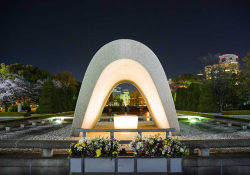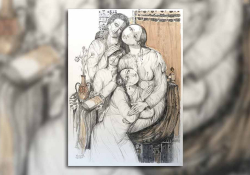Three Poems from Argentina (WLT Translation Prize Winner - Poetry)
Lifecycles
I was chatting with your executioner,
a sweet, tidy man.
He said because it’s me,
I could choose the way you go out.
He said when Eskimos get old,
they wander off the path
to be eaten by bears.
Others prefer a more intensive treatment,
doctors running around, tubes, oxygen,
a priest at the foot of the bed
waving his arms like an airline stewardess.
“There’s no way around it?” I asked.
“I wouldn’t have come down here in this rain if there were.”
Then he went on about the lifecycle of men, their anniversaries,
the sterile dialectics of soccer, childhood and
its enormous sheds that smell like tires.
“But,” he said grinning,
“In the end, the ambulances swallow it all up.”
So I signed the papers
and asked when it was going to happen.
Now! he said.
Now
I hold your recyclable container in my hands,
trying not to cry,
trying to keep quiet,
so from way up there
you’ll be able to find
the outstretched arm of your falconer.
In the Dark Without Keys
It was one of those days when everything goes right.
I cleaned the house and wrote
two or three poems I liked.
I wasn’t asking for more.
I stepped into the hall to take out the trash
when a big gust of wind slammed the door shut
behind me.
I stood there in the dark
without my keys, sensing
the voices of my neighbors
through their doors.
This is just temporary, I said to myself,
but maybe that’s what death’s like too.
A dark hallway,
a locked door with the key behind it,
a bag of trash in your hand.
Construction
The sound is deafening
first thing in the morning.
The furniture trembles and shakes out dust.
Six floors in the architect’s mind:
wood, steel, concrete.
Blow after blow
rises vertically above the treetops.
Yellow helmets
glitter under the summer sun.
Hammer in a rough hand
as a strange language gains ground
in the dust and smoke
of the cinderblock skeleton.
The sounds we heard at night
made us jump out of bed. The water was still there
in the glass on the nightstand. But there was no light,
no earthquake, no movement
under the mineral water mirror.
Rummaging through your trash behind the house,
the young poet slithered.
He’s not venomous, not anymore.
Your wife leans toward the dark side of the bed.
The little hours go by
as a taxi driver nods off
at an intersection.
When I wake, the footprints won’t let me tell a lie:
sneakers on the asphalt.
When are they going to finish
that damn building
that came and stirred up
the center of our sadness.
We left it behind in a huge shed.
It broke down all the time.
The overall man told us
it was wear and tear.
The man with the overalls always knows all.
Used books, used clothes,
the long luminous flea market
winds serpentine along the park’s edge.
When they tear it down, the papers are still
blowing around, clinging desperately
to the blades of grass.
The unlucky ones are crushed
under the sneakers
of the first morning jog.
If you overuse something, it falls apart.
So simple, yet so complicated.
Tomorrow when you’re alone, think of me.
Facedown in bed, praying
in the black church, think of me.
Leaning back stuck
between two stiff seats
crossing the ocean at the speed of sound
think of me. Let the last thing you see before you fall asleep
be for me.
Hard thing to fix, wear and tear.
The overall man
arranges his tools
down in the mechanic’s pit of his garage.
No way around it, he says, the poem won’t turn over,
the marriage won’t turn over,
the day won’t turn over.
Translations from the Spanish
By Allana C. Noyes
Editorial note: From Horla City y Otros (Emecé Cruz del Sur, 2010). Describing the poems as “simultaneously heartbreaking and humorous,” Ms. Noyes included the following in her accompanying cover letter:
These poems are especially deserving of an English-language audience because of their frank and honest approach to the theme of loss. Casas uses simple, everyday language to portray breathtaking truths about love, death, and mourning. Whether Cases is portraying the end of a romantic relationship or the death of a loved one, these poems ring true to the shockingly absurd and ubiquitous fact that all things must end. He crafts his poems with a light hand, leaning more toward humor than dourness. The playful tone he uses to convey these hard truths serves to cast new light on these issues, resulting in a voice that is both ironic and poignant; that is as mystified by the seemingly random rhythm of the world as it is all too familiar with it.
















